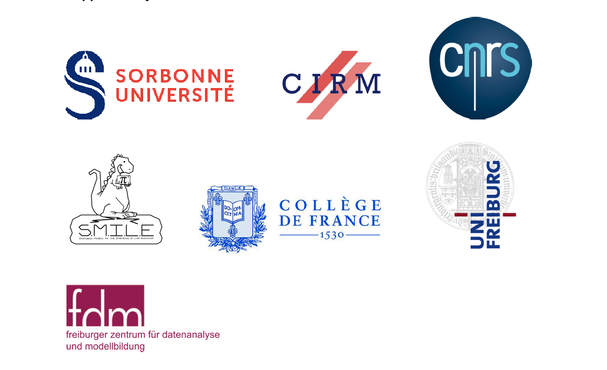5th Workshop on Probability and Evolution
5ème Rencontre Probabilités et évolution
28 June – 2 July 2021
|
Scientific Committee
Comité scientifique Steven N. Evans (University of California at Berkeley) |
Organizing Committee
Comité d’organisation Amaury Lambert (CIRB Collège de France & Sorbonne Université) |
|
For the fifth edition of the tri-annual CIRM conference on probability theory and evolutionary biology, the scientific committee and the new duo of organizers have decided to give the conference a more applied twist and to leave more room to junior scientists. The workshop will focus on three important topics from both the viewpoints of applications and of mathematical developments:
1. Modeling and inferring population structure and demography (human genetics, conservation genetics, demogenetics) 2. From micro to macro-evolution (phylogenetics, adaptive dynamics, speciation modeling) 3. Population genetics meets microbial evolution (CRISPR, pathogen evolution, phylodynamics, gut microbiome, cancer). |
Pour la cinquième édition de la conférence tri-annuelle au CIRM pour les probabilités et la biologie de l’évolution, le comité scientifique et le nouveau duo d’organisateurs ont décidé de donner à la conférence une tournure plus appliquée et de laisser plus de place aux jeunes chercheurs. La rencontre se concentrera sur trois sujets importants du point de vue des applications comme des développements mathématiques :
1. Modélisation et inférence de la structuration des populations et de leur démographie (génétique humaine, génétique de la conservation, 2. De la micro à la macro-évolution (phylogénétique, dynamique adaptative, modélisation de la spéciation) 3. Génétique des populations et évolution microbienne (CRISPR, évolution des agents pathogènes, phylodynamique, microbiote intestinal, cancer). |
Krzysztof Bartoszek (Linköping University) Central Limit Theorems for Ornstein-Uhlenbeck processes on Yule trees: Directly and via Stein’s method
Franz Baumdicker (University of Tübingen) The Evolution of CRISPR in Microbial Communities
Camille Coron (Université Paris Sud) Ancestors’ genetic weights in biparental populations
Manon Costa (Institut de Mathématiques de Toulouse) Heterozygotes advantage and genetic diversity within communities
Peter Czuppon (University of Münster) A model for gametophytic self-incompatibility in plants
Jasmine Foo (University of Minnesota Twin Cities) Evolutionary dynamics of cancer
Raphaël Forien (INRAE Avignon) Fluctuations in stochastic pushed fronts
Adrian Gonzalez Casanova (UNAM Mexico) Seed balancing selection
Joachim Hermisson (University of Vienna) Adaptation in polygenic traits: Between sweeps and shifts
Paul Jenkins (Brigham Young University) A characterisation of birth-death genealogical models through time rescaling
Hélène Leman (ENS Lyon) Dynamics of a plant and pollinator community
Claude Loverdo (CNRS Sorbonne Université) Bacteria in the digestive tract: stochastic models for population dynamics inference; and impact of hydrodynamic ow on neutral diversity
Sarah Otto (University of British Columbia) Fixation Probability when Selection Occurs in Both Haploid and Diploid phases
Sarah Penington (University of Bath) Genealogies in bistable waves
Sophie Pénisson (Université Paris-Est Créteil) Why are viruses so fragile?
Cornelia Pokalyuk (University of Frankfurt) Invasion of cooperative parasites in moderately structured host populations
Peter Ralph (University of Oregon) What’s the effect of dispersal? How gene flow depends on ecology
Emmanuel Schertzer (Sorbonne Université) Probabilistic models related to the SARS-CoV-2 pandemic
Charline Smadi (INRAE) Parasite infection in a cell population with deaths
Dario Spano (University of Warwick) State-dependent immigration and the twoparameter Poisson-Dirichlet diffusion
Paul Tupper (Simon Fraser University) Genomic data and the estimation of lineage- and cluster-specific epidemiological parameters
Hildegard Uecker (Max Planck Institute Plön) Evolutionary dynamics on multicopy plasmids
Lindi Wahl (Western University) Evolutionary rescue can be more likely in smaller populations
Aleksandra Walczak (ENS Paris) Prediction and co-evolution of immune repertoires and viruses
Donate Weghorn (Centre for Genomic Regulation Barcelona) Probabilistic approaches to inference of mutation rate and selection in cancer
Maite Wilke Berenguer (University of Bochum) Lambda-coalescents arising from dormancy
Meike Wittmann (Bielefeld University) Eco-evolutionary extinction vortices and minimum viable populations


